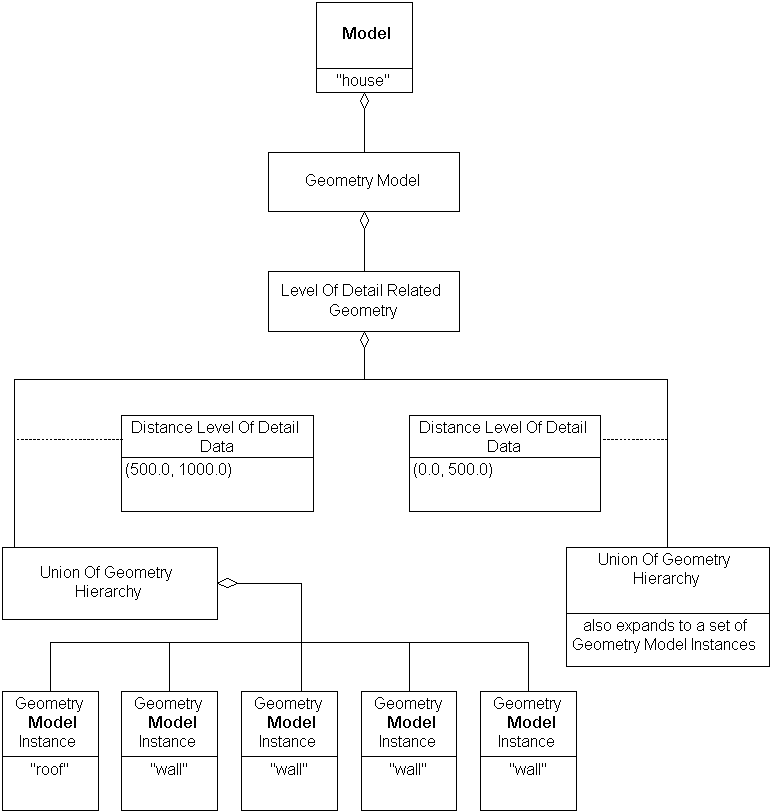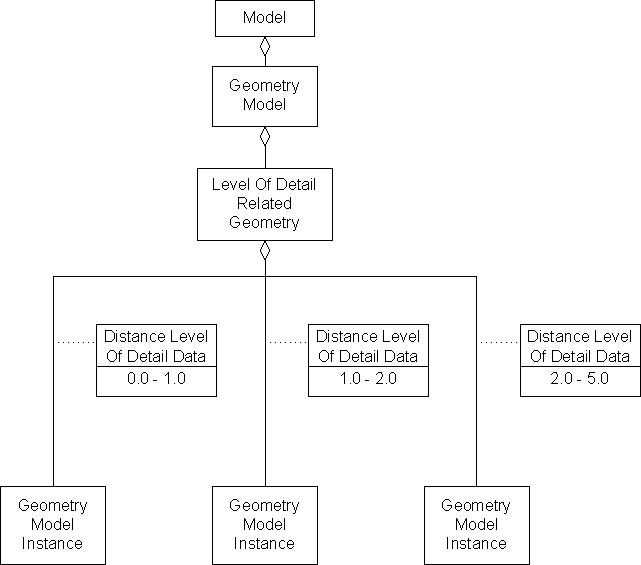The SEDRIS Data Representation Model
APPENDIX A - Classes
LOD Related Geometry
|
|---|
Class Name: LOD Related Geometry
Subclasses
This DRM class is concrete and has no subclasses.
Definition
An instance of this DRM class specifies an aggregation of
<Geometry Hierarchy> instances in
which each component <Geometry Hierarchy> is
an alternate representation of the same entity at a different
level of detail. Each component
<Geometry Hierarchy> is a collection of
<Geometry Representation>
instances with a different, possibly overlapping,
<Base LOD Data>
value, representing alternatives that should be used at different
viewing ranges, map scales, spatial resolution, and so on.
Primary Page in DRM Diagram:
Secondary Pages in DRM Diagram:
This class appears on only one page of the DRM class diagram.
Example
Consider a <Model> of a house, organized based on
viewing ranges. If the viewer is farther away than 1000 metres, the house
is not visible. From 500 metres to 1000 metres, the roof and walls are
visible but not in great detail. From 0 metres to 500 metres, the windows
and door become visible. Consequently, the <Model> is
visible at two distance-related levels of detail: 0-500 metres, and 500-100
metres.

For the more detailed 0.0 - 500.0 metres,
different "wall" <Model> instances
are instanced for the walls containing the windows and doors; otherwise,
the structure of the two levels, for this example, is similar.
Three <Model> instances representing a given building
are created, each with different
<Polygon> counts. The most accurate representation
is useful up to a viewing distance of 1 kilometre, the second from 1
kilometre to 2 kilometres, and the third for 2 kilometres to 5 kilometres.
To indicate this, a fourth <Model> instance can be
created as follows:

FAQs
No FAQs supplied.
Constraints
Associated to (one-way) (inherited)
Associated by (one-way) (inherited)
Composed of (two-way) (inherited)
Composed of (two-way)
Composed of (two-way metadata) (inherited)
Component of (two-way) (inherited)
- zero or more <Alternate Hierarchy Related Geometry> instances, each with a <Hierarchy Data> link object
- zero or more <Animation Related Geometry> instances
- zero or more <Classification Related Geometry> instances, each with a <Classification Data> link object
- zero or one <Environment Root> instance
- zero or one <Geometry Model> instance
- zero or more <LOD Related Geometry> instances, each with a <Base LOD Data> link object
- zero or more <Octant Related Geometry> instances, each with a <Octant Data> link object
- zero or more <Perimeter Related Geometry> instances, each with a <Perimeter Data> link object
- zero or more <Quadrant Related Geometry> instances, each with a <Quadrant Data> link object
- zero or more <Separating Plane Relations> instances, each with a <Separating Plane Data> link object
- zero or more <Spatial Index Related Geometry> instances, each with a <Spatial Index Data> link object
- zero or more <State Related Geometry> instances, each with a <State Data> link object
- zero or more <Time Related Geometry> instances, each with a <Time Constraints Data> link object
- zero or more <Union Of Geometry Hierarchy> instances
Notes
Associated to Notes
An association between a <Feature Representation> instance
and a <Geometry Hierarchy> instance indicates that the
environmental object(s) that they represent have the
semantic relationship indicated by the <Base Association Data>
instance on the association relationship.
An association between two <Geometry Hierarchy> instances
indicates that the environmental object(s) that they
represent have the semantic relationship indicated by
the <Base Association Data> instance on the association
relationship.
Associated from Notes
An association between a <Feature Representation> instance
and a <Geometry Hierarchy> instance indicates that the
environmental object(s) that they represent have the
semantic relationship indicated by the <Base Association Data>
instance on the association relationship.
An association between two <Geometry Hierarchy> instances
indicates that the environmental object(s) that they
represent have the semantic relationship indicated by
the <Base Association Data> instance on the association
relationship.
An association from a <Hierarchy Summary Item> instance to a
<Geometry Hierarchy> indicates that the <Hierarchy Summary Item>
summarizes that <Geometry Hierarchy>.
An association from a <Reference Surface> instance to a
<Geometry Hierarchy> indicates that the <Geometry Hierarchy>
organizes the geometric objects that specify the resolution
surface of the <Reference Surface>.
Composed of Notes
In the case where multiple <Collision Volume> components are
specified for a given <Aggregate Geometry>, the union of the
volumes thus specified is used in collision detection.
Fields Notes
If the value of the unique_descendants field is SE_TRUE, each
descendant of this aggregation,
that is, each <Geometry Representation> instance that exists
in the component tree
rooted at the given <Aggregate Geometry>, shall be unique, in the
sense that it shall appear in only one branch of this aggregation.
If unique_descendants is SE_FALSE, at least one
<Geometry Representation> instance
appears in more than one branch of the aggregation.
If the value of the strict_organizing_principle field is SE_TRUE,
each branch of this aggregation
strictly complies with the organizing principle for its
particular subclass. If this value is SE_FALSE, at least
one branch does not strictly comply with the given
organizing principle. See the organizing principle constraint
for each specific subclass for details.
The lod_data_type field specifies the subclass of <Base LOD Data> of
each link object in the given organization.
Prev: LOD Related Features.
Next: LSR 2D Location.
Up:Index.
|
Last updated: July 16, 2004
|
Copyright © 2004 SEDRIS™
|
|

